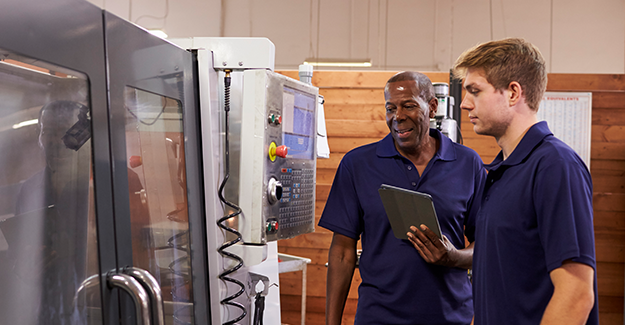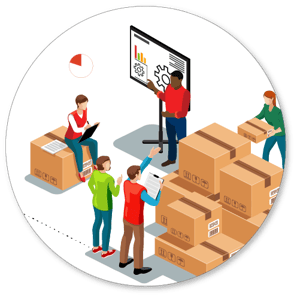
Training
6 min read
Why HR Shouldn't Manage Your Technical Skills Training

Amid the Silver Tsunami, HR departments are hustling to onboard and fill personnel gaps, but they can’t predict the evolving demands of your operations.
Manufacturing companies are failing to adapt their operational training strategy to meet the needs of a workforce in transition.
Put simply — manufacturing doesn’t have a skills gap, it has a technical training gap.
Where Compliance Falls Short

Human Resources departments have traditionally been responsible for maintaining compliance and filling workforce shortages. Unfortunately, compliance-based training systems are unable to deliver the kind of competencies and technical training that operational teams need to thrive.
HR is more tuned into the kind of training that has a legal agreement associated with it. Think of your basic onboarding, harassment training, safety protocols, time-off policies, etc.
This kind of training typically involves a simple verification that employees have read and understand the material. At most, employees have to complete short tests to demonstrate basic competency.
Beyond learning safety protocols and basic onboarding, the operational workforce requires continuous technical training and mentorship. 50-step machine changeovers, or complex sanitation procedures require attention to detail and repetition to become proficient.
When it comes to the kind of training needed for operational excellence, the “compliance style” of training just doesn’t meet the mark.
Skills That Have an Impact
Operational teams rely on a handful of specialized in-house experts to solve problems and improve processes. HR is successfully navigating personnel and legal challenges but can’t predict the technical knowledge that the industrial workforce thrives on.
Think back to the last time your operations had unplanned downtime, or a failed changeover. How was the problem solved?
Likely, several workers assessed the problem by drawing on decades of experience and technical know-how.
These jack of all trades are able to adapt and keep factories functioning by relying on a high level of competency and a broad range of skill sets.
But as the generation of experienced factory workers retire, these valuable skills are vanishing. Operational teams need to make sure that new hires have the proper knowledge to not only perform their work, but adapt and maintain excellence.
The Technical Training Gap
Traditional manufacturing training methods are failing to address the technical skills gap because they rely on an abundance of mentors to help train new hires.
Today, there aren’t enough mentors available to go around.
These (previously successful) approaches also assume that employees will stick around long enough to accumulate knowledge/skills organically.
Today, the average worker only stays with a company for 3.2 years. In many manufacturing sectors, this is even less.
As a result, workers don’t have the time or resources to pick up the essential technical skills that your outgoing workforce has relied on. After workers develop the foundational skills needed to start contributing, further skill development needs to be provided, tracked, and maintained.

It’s Already Costing You
With reduced tenures and shortage of experienced mentors, the frontline workforce needs a more adaptive and scalable training strategy. True, it's a risk to invest in a workforce that might not stick around. But an ill-equipped workforce is far more costly.
Companies that fail to address these technical skills within their existing workforce are paying for it. The average U.S. manufacturer is losing an estimated 11% of its annual earnings (EBITDA), or $3,000 per existing employee, due to the skills gap.
This problem can’t be solved through external recruiting or marketing efforts. The technical training gap exists within your organization. Outdated training practices have failed to provide the incoming generation with the practical skill sets that can make a real impact.
Time to Pass the Baton
The good news is that we’ve done this before. In a recent survey of working Boomers in the United States, two-thirds said that the prior generation did a good job of transferring their knowledge before they retired. Even better, experts are eager to share their wisdom, with 81% expressing a strong desire to mentor the next generation.
Put simply, it’s time to grab the baton. Many companies have formalized systems in place to track compliance-focused training categories, but it shouldn’t stop there. Skills management is taken seriously during onboarding and safety training, but retraining and upskilling has been left to archaic methods.
Take a look at solutions like Dozuki, that are purpose-built around the modern needs of operational workforce knowledge. Start investing in skills that will have a real impact, today.
Topic(s):
Training
Related Posts
View All Posts
Frontline Digital Transformation
Top Challenges Impacting the Frontline Workforce
5 min read
Even with advancements in technology and automation, the frontline workforce remains essential to modern manufacturing operations. In fact, 72% of factory work is still...
Continue Reading
Continuous Improvement
How to Scale Technology Across Manufacturing Operations with 3M
39 min read
Most manufacturing companies don't have people dedicated to evaluating and deploying modern tools. At best, IT or HR takes responsibility for new technology and doesn't have...
Continue Reading
Training
How to Capture Expert Knowledge Before it's Lost
6 min read
It’s no secret. Manufacturers are coping with a massive wave of retirements. With over a quarter of the workforce over the age of 55, many workers are leaving their jobs with...
Continue Reading



